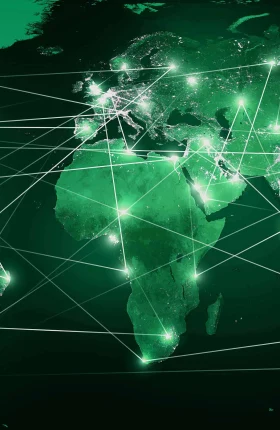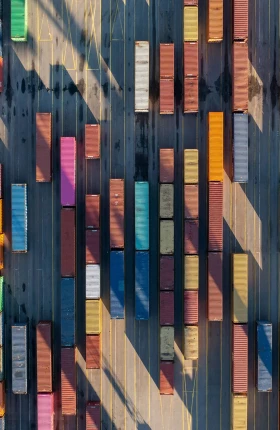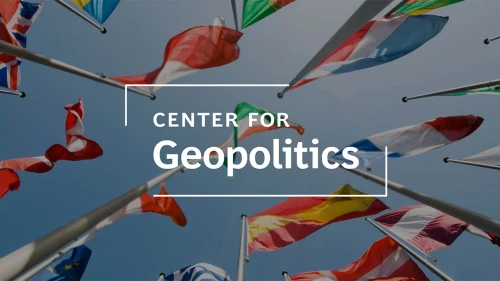In addition to their traditional advantages in cost and resources, companies in the region are now expanding globally through innovation, cultural influence, and strategic risk-taking.
Featured Insights
Global Business Priorities

Article
April 28, 2025

Article
June 13, 2025
CEOs must broaden their focus from immediate emergencies to longer-term considerations if they are to establish competitive advantage for the future.

Article
May 28, 2025
From trade wars and geopolitical shifts to regional wars and climate change, business leaders must manage through unprecedented complexity in the global landscape.

Article
March 13, 2025
Companies have a huge growth opportunity in emerging markets, but only if they have the right approach to get their products onto store shelves and into consumers’ hands.

Slideshow
November 11, 2024
Leadership in technology and business relies heavily on one factor: access to the world’s top talent.
BCG's Center for Geopolitics offers insights and strategies to navigate global power shifts, helping businesses prepare for the future of geopolitics.
Geopolitics, Tariffs, and Trade

Article
July 18, 2025
The mantra in business used to be “cost is king,” then “resilience at all costs.” But in these uncertain and complex times, companies need an approach that delivers both.

Article
June 24, 2025
The impending big boost in European defense spending will create major new markets for commercial firms across sectors—and a historic chance to transform the continent’s industries.

Article
June 17, 2025
Five actions can help CEOs move forward with big investment decisions, despite uncertainty.

Article
May 28, 2025
CEOs will have to start making big decisions again soon, or risk future growth. Here’s how they can stare down uncertainty and move forward.

Article
May 16, 2025
Ahead of their annual summit, G7 leaders are turning to the Business Federations of the Group of Seven, or B7, for guidance and recommendations as they face both economic concerns and geopolitical headwinds.

Article
April 10, 2025
By choosing its targets carefully, rather than retaliating tit for tat, Europe hopes to avoid escalating a trade war and instead coax Washington to the bargaining table.

Article
April 23, 2025
Rising protectionism is increasing the risk of breaking complex and ever-changing trade rules. Incorporating trade compliance across the value chain is essential.

Update
April 18, 2025
Investor sentiment is cooling amid US tariffs, but expectations of US equities and listed companies remain high.
Explore Tariff Insights By Industry

Article
May 14, 2025
The new tariffs affect everything from insurers' claims underwriting to investment returns. But there's opportunity for companies that navigate the changes successfully.

Article
May 8, 2025
The tariff escalation between the US and key trading partners will hit the beauty industry, but there's opportunity for companies that can adapt strategically.

Article
May 8, 2025
Explore three potential tariff scenarios, their impact on auto sales, and what leaders can do to stay ahead.

Article
May 2, 2025
In the face of recent tariff proposals and widespread economic uncertainty, IT leaders are prioritizing controlling costs—and doubling down on AI investments to help manage budgets and boost productivity.

The impact of tariffs will be felt across the automotive industry. How individual automakers are likely to be affected will depend largely on their specific production and sourcing footprints.

Update
February 21, 2025
New tariffs will have a far-reaching impact on manufacturing costs and supply chains across a range of industries including those using or producing derivative products.
Navigating Tariffs
Explore facts about tariffs, debunk common myths, and understand their real impact on your business.
Global Talent

Slideshow
December 5, 2025
For the first time since 2020, the pace of movement across the more than 200 countries we track has fallen. And new talent hot spots are emerging.

Slideshow
June 18, 2025
The US still led as the destination of choice, but the UAE is catching up. Find out more about the work-related migration of the best and brightest.

Article
January 27, 2025
The competition for talent is taking on a new urgency, as countries increasingly compete for skills that can give them a strategic edge beyond economics.

Slideshow
November 11, 2024
Leadership in technology and business relies heavily on one factor: access to the world’s top talent.

Article
March 28, 2024
Public talent investment funds come with a clear business case for action: attracting and retaining global top talent generates a substantial return on investment.
Customer Insights

Slideshow
April 18, 2025
But what happens in terms of spending will vary by situation, by country, and by category, so pockets of growth remain to be tapped.

Article
June 25, 2025
Travel companies should seek ways to attract local and regional tourists as well as international visitors and prepare for a rapidly evolving customer base.
BCG managing director and partner Aparna Bharadwaj looks at under-the-radar affinities that reach beyond individual cultures, highlighting patterns that could bring the world closer together.

Article
September 13, 2022
A BCG survey confirms that most consumers are ready to embrace sustainable products. Here are three ways to help make that happen.

Article
April 24, 2024
Artificial intelligence isn’t new, but broad public interest in it is. Our survey of consumers found that people are surprisingly knowledgeable and excited about AI.








